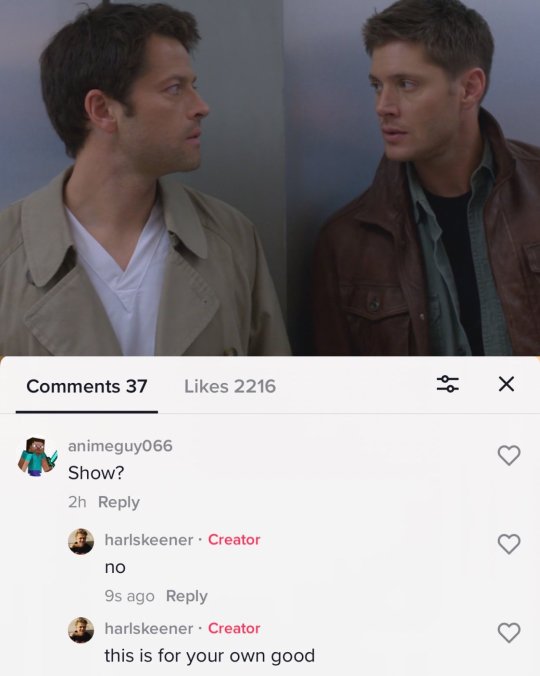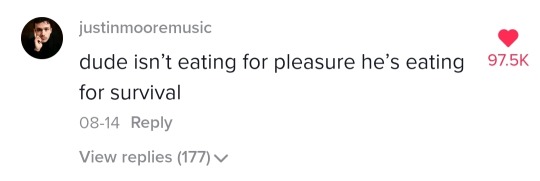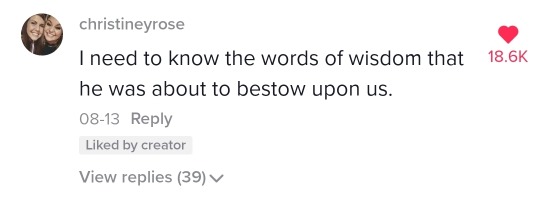Text

serializd review of "the haunting of hill house"
0 notes
Text

Title: The Bandcamp Situation (fantano)
1 note
·
View note
Text

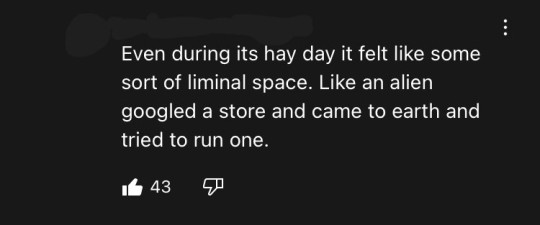
1 note
·
View note
Text
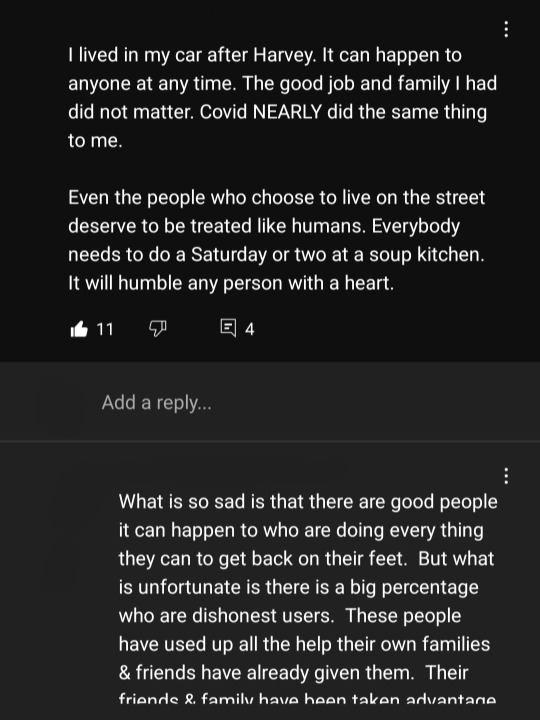


(Why y'all hate homeless people.)
1 note
·
View note
Text
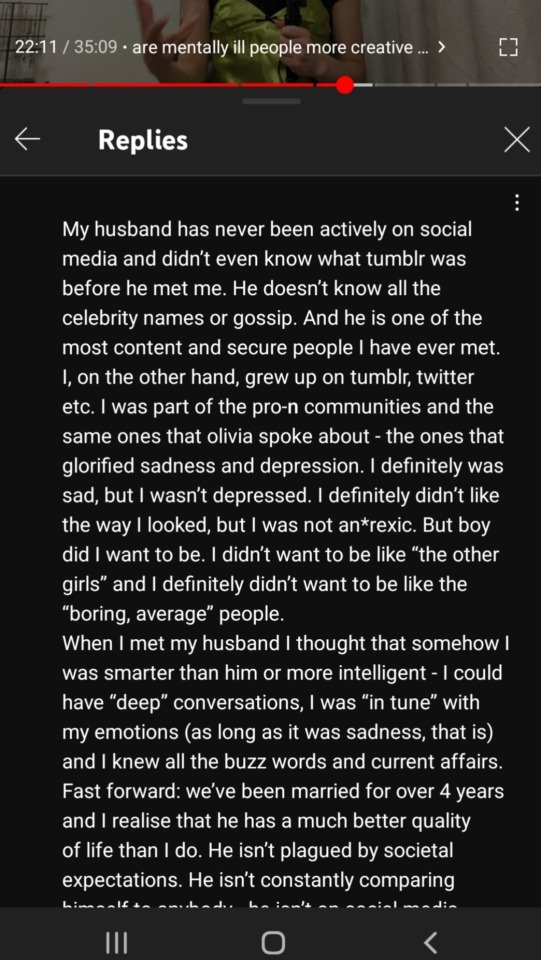
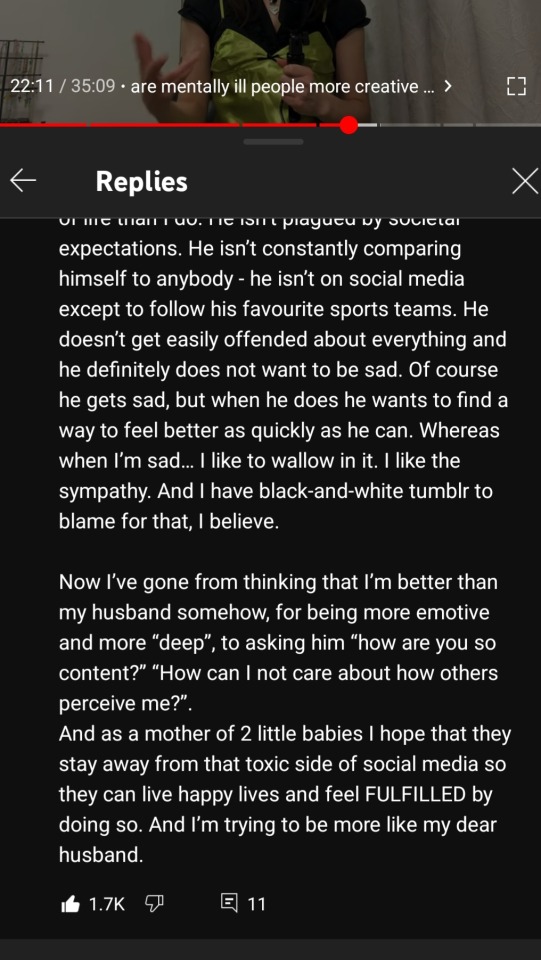
(the desire to be sad: "tragically beautiful" art & romanticizing mental illness)
0 notes
Text


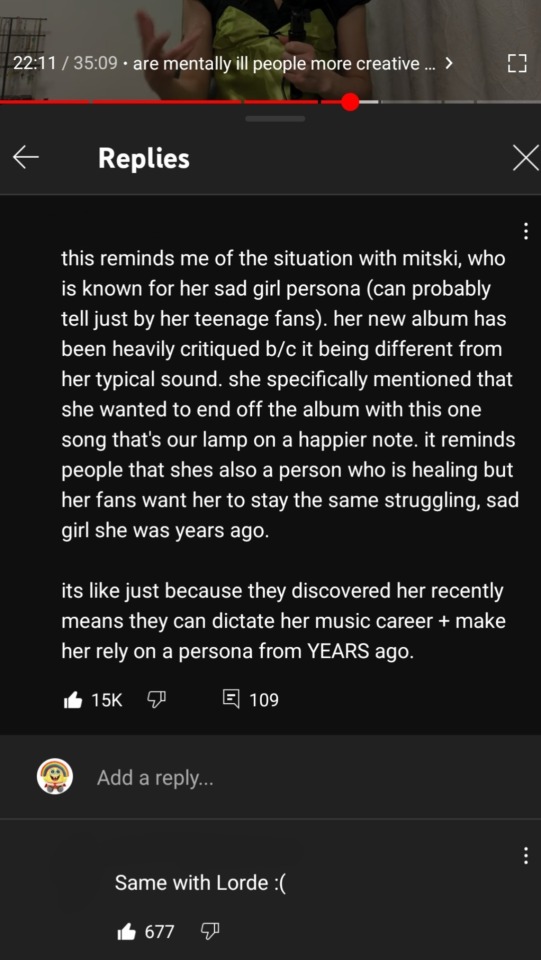
(the desire to be sad: "tragically beautiful" art & romanticizing mental illness)
1 note
·
View note
Text

(The Youtuber Murdered By An Obsessed Fan - The Case of Christina Grimmie)
1 note
·
View note
Text
youtube

0 notes
Text

kitty kins fucking obliterated in the comments section of a knitting video
103K notes
·
View notes
Text
on ethics and the good place





(source: The Good Place Doesn't Make Sense | Big Joel)
Image ID: 5 screenshots with the following information:
[ I'm normally a fan of your work, but I have to say, when it comes to this show, I think you kind of generally missed the mark, both on an in-text level and on a meta-textual level. I'll try to explain my reasoning, but I'm just writing out a comment, it's not going to be thoroughly reviewed and edited, so apologies if it's a bit sloppy.
Part 1: The Beginning. Chidi's beliefs and actions in the beginning are not a contradiction as you present them to be. A big part of the pursuit of moral philosophy is to determine whether or not there is an objective ethics and, if there are, what they are, and if there aren't, what we should do about it. "What is 'Ethics'?" is as important of a question in philosophy as "What is ethical?" Chidi is in the afterlife, being told by some powerful being that is able to present full information on his life, that there is, in fact, an objective ethics. Not only that, but Chidi won the ethics game! All that work you've been doing studying moral philosophy your whole career?
Well, it turns out, YOU WERE RIGHT! The ethics that you've studied, researched, taught, and (from what we can tell, largely) practiced is enough in line with this objective system of morality that you made it into the good place. Your version of ethics is a good one. There is no reason for Chidi to believe (at this time) that the morality of this system is arbitrary and fallible because there's no evidence to suggest that. It was actually pretty deceptive to include the clip from a later point of Michael and Janet going to a different part of the afterlife, without the gang, well after the cat's out of the bag that Michael's neighborhood is in the bad place, where Michael, Janet, and we as the audience find out how arbitrary a lot of these rules are. These are not the rules shown to Chidi in season 1. The Chidi of season 1 would have every reason to believe that the morality he is teaching Elanor is what got him into the good place. That's Chidi of season 1.
Then we move on to Chidi in season 2. At this point, we still don't have reason to believe that the morality off the system is one to call into question. All we know at this point is that they're in the Bad Place, they were intended to torture each other, but they just got better instead. Again, this at the time can be attributed to Chidi's system of ethics. He's not wrong when he says he knows more about Michael when it comes to ethics because he's still under the assumption that there is a SYSTEM of ethics underneath these rules that Michael cites. Given that Michael is a bad place architect, it's reasonable to believe that he can access this list of rules without knowing what connects them, and Chidi understands what makes the list of rules what it is, even if he doesn't know the exact point value of each thing. Michael can say "This action has this negative points value" but that's it. Chidi can explain WHY an action is a bad one.
Part 2: The End In regards to whether or not the judge would be swayed by Chidi's argument, I don't think you're being as reasonably charitable as you could be to the show. The judge is omnipotent but, unlike Janet, she is NOT omniscient. She does not, actively at all times, know everything about everyone everywhere at all times. She has ACCESS to all this information, but it's in an external system she has to retrieve. So it's unfair to say that she knows that "people change on earth all the time." More importantly, the show seems to make an important moral distinction between them changing in life, and them changing after life, that you're just discarding. The idea of the system is that, after one lifetime, a human will have revealed who they are, what kind of person they are, if they are fundamentally good or bad. The fact that the gang got better instead of just continuing to be bad was a surprise to basically everyone involved. The argument they had to make to the judge was that the gang wasn't actually special, that nearly anyone would become better when given the structure they had. You also disregard the fact that the judge went to earth as a human to experience the changed world and saw that the current system WAS flawed, which she didn't believe at first. Keeping this out of the video does make her decision seem arbitrary when it was not. You act as if the information presented and organized for the judge were things that she already knew and thought about, but they were not.
Part 3: The Whole Thing I think you're looking at what the Good Place is trying to say all wrong. You're coming from the perspective that "People shouldn't be tortured full stop" as if it's an obvious conclusion when, to a lot of people, that isn't the case at all. The Good Place is a commentary and criticism of the Christian morality perspective. They try to do some waving off early on to suggest that most religions were party right, partly wrong, but when you look at it on the whole, it's pretty obvious which religions it is criticizing. We have a system of the afterlife with "the good place" where good people go to be happy, and "the bad place" where bad people go to be tortured. We have a system that seemed to make sense far in the past but we now see has been broken for literal hundreds of years because it didn't update to match the changing world. We have a list of rules that are a mix of things that make sense, and a list of things that don't really make sense but probably have some stupid explanation deep underneath it that doesn't fit anymore. You have an all-powerful judge that is the final arbiter of what is right and wrong. You've got a system where people just sort of accept that good people should be rewarded, and bad people should be punished.
It's that final line that I think that should be the central consideration when we examine the show. That's what The Good Place is fundamentally trying to convince people. It's a show presented to a largely western audience in the early 21st century. It's not a timeless esoteric work of philosophy that was meant for people to see and understand throughout the ages once they've already had some level of philosophical education. Think about the American penal system. A lot of people would probably agree that there needs to be some amount of reform to the prison system... but how many do you think agree that it should be outright abolished? How many people in America, today, actually hold the notion that "bad people should not be punished for their bad deeds"? That's a VERY common way of thinking. If you do something bad, you're a bad person, and you should be punished for being a bad person. The Good Place isn't trying to give us this huge understanding of human morality and the ontology of ethics.
"People improve when they get external love and support. How can we hold it against them when they don't?"
This is basically the big takeaway from the show. Yes, if you really wanted, you could look at The Good Place in a very literal fashion and explain why the ethics in it can kinda suck. But I think looking at the show through that lens is a mistake.
The show is trying to tell the average American a message that
People's actions are largely influenced by their surroundings
Sometimes people do bad things because of what they've been through, but
Just because someone did bad things doesn't mean they should be punished for it, let alone punished eternally.
My problem with your video here is that you're criticizing the show for arriving at a conclusion you've already come to, when others might not have. Saying that you're upset with The Good Place for no one immediately challenging the notion that "Bad people should be tortured because they're fundamentally bad" would be... kind of like saying that it doesn't make sense to you Sam-I-Am can convince Guy-Am-I to try green eggs and ham because it's obvious that people shouldn't be close-minded, so Guy-Am-I must have some other reason for saying no other than being close-minded for no reason. Like, sure, you can technically correctly have that reading of a children's story, but other than the sake of having a 'hot take' as to why this thing meant to teach a very basic lesson is flawed when you take into consideration more things than that basic lesson, what do you seriously gain from it?
The show is weird to you. I get that. But going back and reading children's books that you've never read before would probably also be weird to you. But if you were to re-examine the show from the perspective of someone that believes that yes, bad people should be punished for being bad, and people do things because they're bad people, the decisions of the show make a lot more sense than someone who hears "This person committed a mortal sin on earth so they're going to hell for eternity" and thinks "How is that a fair response?" The show challenges this idea and, more importantly, gives people the tools to draw parallels and realize that a lot of crime happens because of people's situations and not strictly because of a moral failing fundamental to the person. It lets them see that hey, instead of sending people to prison for selling drugs and just keeping them locked up doing nothing productive, maybe these are people who we should be trying to rehabilitate and improve. Maybe we should focus more on why people do bad things and help fix that, instead of just punishing them once they've already done it, and maybe we shouldn't just take a system of morality that was designed literally thousands of years ago and assume it will work perfectly fine in the modern-day. These are all points obvious to you, Big "Henry" Joel, but to the average middle American that this show is trying to reach, that's still a lesson that needs to be learned. ]
12 notes
·
View notes
Text

3 notes
·
View notes
Text

source: A Deep Dive Into Down to Earth with Zac Efron
1 note
·
View note
Text

source: A Deep Dive Into Down to Earth with Zac Efron
1 note
·
View note
Text

found this comment on a video of some swans crossing the street. wow.
59K notes
·
View notes

